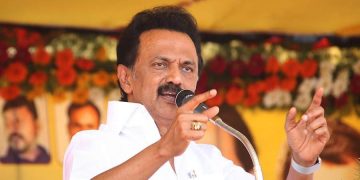The question about how a woman who is elected to the post of President should be addressed in Hindi first came to the fore when Pratibha Patil became the first woman to occupy the highest constitutional post in India in 2007. There were debates about whether she should be addressed as ‘Rashtrapati’ or ‘Rasthrapatni’, but that debate did not invite the amount of uproar that was caused recently when Adhir Ranjan Choudhary, the Leader of Opposition in the Lower House addressed President Droupadi Murmu as ‘Rasthrapatni’. Unleashing a scathing attack on Choudhary, the ruling BJP demanded an apology from the Congress party for insulting President Murmu which led to huge drama both inside and outside the Parliament. Though Choudhary apologized for his remark citing his poor Hindi, the issue has sparked a much necessary debate that concerns the gendered nature of our language.
The controversy that emerged around Chaudhary’s remark can only be understood if we look into what the two words ‘pati’ and ‘patni’ mean and what meanings are attributed when both these words are suffixed with Rashtra (nation). The Hindi word Rashtrapati is used as a translation of the English word ‘President’ which is generally used to refer to the presiding head of a group and is a gender-neutral term, but its Hindi translation as ‘Rashtrapati’ is not neutral, because of the suffix ‘pati’.
Etymologically the Hindi word ‘pati’ is part of the Indo-European language family where it usually means ‘lord’ or ‘master’. When used as a suffix it usually means ‘lord of…’. For e.g. the Sanskrit word for a married householder is ‘Grahapati’ which means lord of the household. Similarly, ‘Senapati’ means the commander of the army; ‘Ganapati’ means lord of the tribe; ‘Chhatrapati’ means the lord of kings. Such examples can only be multiplied to show the power relation that the word ‘pati’ denotes. In our everyday usage, the word ‘pati’ generally means husband but again the inherent patriarchal power relation is reflected through compound words like ‘pati-dev’ or ‘pati-parmeshwar’, which refer to the husband as lord or god for the wife.
In contrast to pati, the word ‘patni’, which is used for ‘wife’, has no such meaning. It is a relational term unlike ‘pati’ which is an independent term and is used only for a married woman. It is simply a female derivative of pati and therefore has an inherent sexual connotation and meaning attached to it. ‘Patni’ is merely a sexual partner of a man, moreover, there is no counterpart to Hindi words like ‘pati-dev’, or ‘pati-parmeshwar’ in any Indian vernacular for a married woman, which only shows the power differential between pati and patni in Indian society. And herein lies the root of the recent Rasthrapatni row.
The word ‘Rashtrapati’ is a combination of two Hindi words, ‘Rashtra’ and ‘Pati’. When used as a translation for the English word President, it is usually understood to mean ‘leader of the republic’ and not ‘husband of the nation’. And this meaning is in perfect congruence with other such words that have the suffix pati. But when the word ‘patni’ is suffixed with the word ‘Rashtra’ to produce the compound ‘Rasthrapatni’, the meaning takes a sexual connotation to mean ‘wife of the nation’, which again is just a reflection of how the word ‘patni’ is entrenched in the Indian mindscape, that is, as a ‘sexual being’ and ‘wife’.
In an article titled ‘Language and Woman’s Place (1972), Robert Bakoff for the first time explored the relationship between language and gender and argued that “women generally use linguistic forms which are lower/subordinate to that of men with the use of tag questions (isn’t it?, am I?), questioning expressions or mitigators (sort of, I think)”.
According to a study by Francesca Di Garbo, Bruno Olsson, and Bernhard Wälchli titled ‘Grammatical gender and linguistic complexity’ (2011) about 75 per cent of the world’s languages propagate sexism where one finds abundant use of male pronouns, and Hindi is no exception. In our everyday lives, we very often ignore the use of ‘heavily’ gendered terms in our conversations. When we use English words like ‘policeman’, ‘fireman’, ‘chairman’, and ‘salesman’, we skip the very fact of gender biases.
As to why this sexism prevails in our everyday language, we need to look at the sources of our vocabulary formation like dictionaries, newspapers, or journals where editors are mostly men across the globe who probably don’t understand the inference of using a particular language in a specific way. Hence, we can say the persistence of gendered language is managed by the overall structure itself.
In fact, it is a common practice among all political parties to use the word ‘adhyaksh’ while referring to their national as well as state presidents. Therefore, there stands no reason why the word ‘Rashtrapati’ should not be replaced with ‘Rashtra-adhyaksh’ or with another term ‘pradhan’ which was used to refer to the ‘president’ in the draft Hindi version of the Indian Constitution, making the nomenclature of the highest constitutional position gender neutral.
The ‘Rasthrapatni’ row, though an outcome of odd political rationality, has presented us with an opportunity to reflect upon the patriarchal roots of certain popular Hindi terminologies like
udhyogpati (industrialist), sabhapati (chairperson/man), lakhpati and crorepati in order to create gender-neutral terms for them.
The writer is Assistant Professor, Department of Sociology, Maitreyi College, University of Delhi. Views are personal.






































